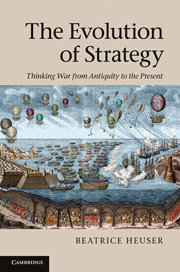Book contents
- Frontmatter
- Contents
- Acknowledgements
- A note on referencing
- Part I Introduction
- PART II Long-term constants
- PART III The Napoleonic paradigm and Total War
- PART IV Naval and maritime Strategy
- PART V Air Power and nuclear Strategy
- PART VI Asymmetric or ‘small’ wars
- PART VII The quest for new paradigms after the World Wars
- 17 Wars without victories, victories without peace
- 18 No end of history: the dialectic continues
- 19 Epilogue: Strategy-making versus bureaucratic politics
- 20 Summaries and conclusions
- Bibliography
- Index
18 - No end of history: the dialectic continues
from PART VII - The quest for new paradigms after the World Wars
Published online by Cambridge University Press: 05 June 2012
- Frontmatter
- Contents
- Acknowledgements
- A note on referencing
- Part I Introduction
- PART II Long-term constants
- PART III The Napoleonic paradigm and Total War
- PART IV Naval and maritime Strategy
- PART V Air Power and nuclear Strategy
- PART VI Asymmetric or ‘small’ wars
- PART VII The quest for new paradigms after the World Wars
- 17 Wars without victories, victories without peace
- 18 No end of history: the dialectic continues
- 19 Epilogue: Strategy-making versus bureaucratic politics
- 20 Summaries and conclusions
- Bibliography
- Index
Summary
In war, there is no substitute for victory.
(General Douglas MacArthur 1951)Do you want to win, or do you want peace?
(Martti Ahtisaari, q.i. Lyall 2008)The Napoleonic paradigm strikes back: Summers’s Clausewitzian critique
At the end of the Cold War, the euphoric hope spread that the collapse of Soviet-led communism might mean the end of ideological strife in the world. Assuming that no new (or old) ideology (or religion) would rise up to challenge liberal democracy as ‘best of all possible’ systems, to paraphrase Voltaire, and assuming that wars originated mainly from ideological disagreement, one could argue that this was, in a Hegelian or Marxist sense, the end of dialectical history (Fukuyama 1989). But the dialectical debate between those who favour the abandonment of the Napoleonic paradigm and those to whom it is the only thing that makes sense in military terms continues.
Not even all Western strategists found this cultural shift in the West easy to accept, as we have seen in the context of the evolution of air power after 1945. In 1982 Edward Luttwak deplored the fact that
the West has become comfortably habituated to defeat, Victory is viewed with great suspicion, if not outright hostility. After all, if the right-thinking are to achieve their great aim of abolishing war they must first persuade us that victory is futile, or, better still, actually harmful. To use Stalinist language, one might say that the struggle against war requires the prior destruction of the very idea of victory. (Luttwak 1982: 17)
His criticism, crucially, highlights the fact that this Western shift of perceptions is unparalleled by thinking in many other countries and cultures. Indeed, Robert Cooper argues that it is not even shared widely within the USA, which is still operating very much as a ‘modern’ state that fiercely defends its right to use force as it sees fit, with or without a mandate from the world’s higher authority, the UN, which has now taken the place of God in the just war theology of old. For Cooper, it is only Europeans that have acquired a ‘post-modern’ mindset leading them to renounce the use of force to settle their own quarrels by force. Even he rightly points out that the peaceful European Union’s central problem is its coexistence on one planet with ‘modern’ states that have not renounced the use of force, and with ‘pre-modern’ entities aspiring to statehood and a state monopoly of the use of force, but in reality torn by rivalling claims to power (Cooper 2000).
- Type
- Chapter
- Information
- The Evolution of StrategyThinking War from Antiquity to the Present, pp. 472 - 487Publisher: Cambridge University PressPrint publication year: 2010



